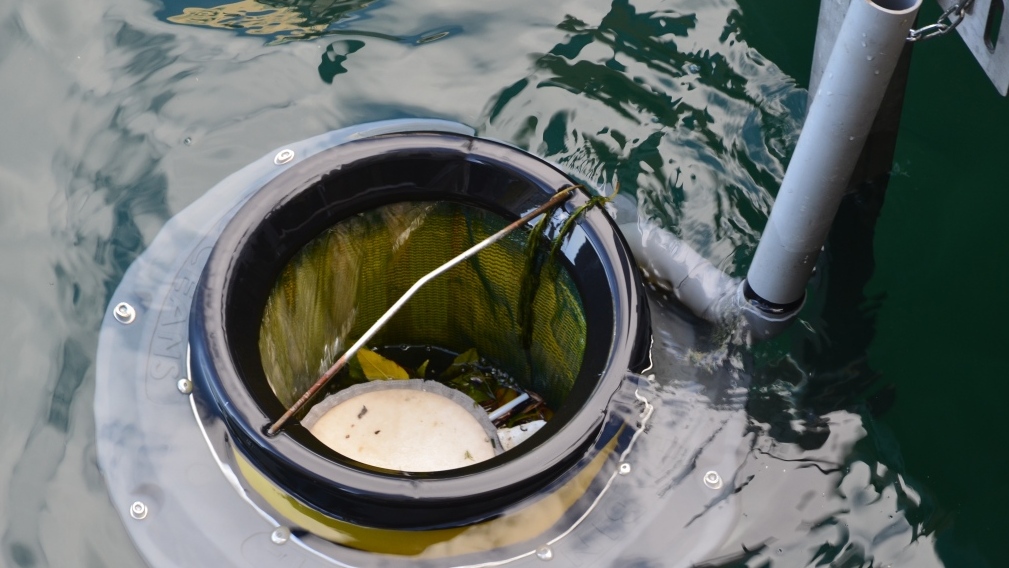Nearly 100,000 pieces of plastic removed from the Toronto Harbour. Here's what else was found
The team behind Toronto’s Trash Trapping Program Network says it removed close to 100,000 small pieces of plastic from the city’s harbour last year.
PortsToronto, in partnership with the University of Toronto’s so called “Trash Team,” said they caught 92,891 pieces of pollution between May and September through the use of 10 Seabins -- which are positioned near the water’s surface and suck trash into a catch bag with a pump.
- Download our app to get local alerts on your device
- Get the latest local updates right to your inbox
“Seven U of T Trash Team research assistants worked daily throughout the summer to empty PortsToronto’s Seabins and quantify and characterize what we diverted from Lake Ontario,” Dr. Chelsea Rochman, Head of Operations at the U of T Trash Team, said in a news release issued Wednesday.
In addition to the Seabins, the program also removed thousands of pieces of trash using a device called a LittaTrap, which are placed in storm drains throughout the Queens Quay area, as well as skimming the surface water in the harbor to divert a total of 96,208 pieces of waste between all three methods.
By weight, the program removed 118.15 kilograms of anthropogenic (originating from human activity) debris and microplastics, which PortsToronto said can harm wildlife and contaminate drinking water.

The top 10 large items of debris caught in 2022 include:
- Plastic film
- Plastic fragments
- Cigarette butts
- Foam
- Food wrappers
- Plastic bottle caps
- Paper
- Plastic cigar tips
- Plastic bags
- Plastic bottles
Also found, and for the first time in the four years of the program, were dozens of “fatbergs,” which PortsToronto describes as “rock-like masses” formed by the combination of fat, grease, and wastewater materials including wet wipes and diapers.
“In 2022, PortsToronto Seabins collected more than 100 fatbergs, a powerful reminder to residents of the city to consider carefully what is washed down the drain,” the group said.
PortsToronto President and CEO RJ Steenstra said he was “encouraged” by the progress made by the program so far amid a rise in plastic pollution that he believes “seriously threatens the sustainability and biodiversity” of the city’s lakes and waterways.
“[We] look forward to continuing to learn from waste collected by trash-capturing devices like Seabins here at home and worldwide as part of the International Trash Trap Network in an effort to educate, change behaviour and ultimately preserve our waterways for future generations,” Steenstra said.
To read the full 2022 report, click here.
CTVNews.ca Top Stories

Spectacular aurora light show to be seen across Canada Friday night
A rare and severe solar storm is expected to bring spectacular displays of the northern lights, also known as aurora borealis, across much of Canada and parts of the United States on Friday night.
'Tactical evacuations' underway near Fort Nelson, B.C., as wildfires encroach
The BC Wildfire Service says 'tactical evacuations' began Friday near Fort Nelson, B.C., due to an out-of-control wildfire that has grown rapidly since it was discovered earlier in the afternoon.
Snowbirds in Vancouver for puck-drop flyby as Canucks face Oilers
The Canadian Forces Snowbirds will be performing a flyover across downtown Vancouver at the start of tonight's Stanley Cup playoff game between the Canucks and the Edmonton Oilers.
McGill University seeks emergency injunction to dismantle pro-Palestinian encampment
McGill University has filed a request for an injunction to have the pro-Palestinian encampment removed from its campus.
Which Canadian cities have the highest and lowest grocery prices?
Where you live plays a big factor in what you pay at the grocery store. And while it's no secret the same item may have a different price depending on the store, city or province, we wanted to see just how big the differences are, and why.
Swarm of 20,000 bees gather around woman’s car west of Toronto
A swarm of roughly 20,000 bees gathered around a woman’s car in the parking lot of Burlington Centre.
Barron Trump declines to serve as an RNC delegate
Former U.S. President Donald Trump's youngest son, Barron Trump, has declined to serve as a delegate at this summer’s Republican National Convention, according to a senior Trump campaign adviser and a statement from Melania Trump's office.
U.S. says Israel's use of U.S. arms likely violated international law, but evidence is incomplete
The Biden administration said Israel's use of U.S.-provided weapons in Gaza likely violated international humanitarian law but wartime conditions prevented U.S. officials from determining that for certain in specific airstrikes.
'State or state-sponsored actor' believed to be behind B.C. government hacks
The head of British Columbia’s civil service has revealed that a “state or state-sponsored actor” is behind multiple cyber-security incidents against provincial government networks.

































